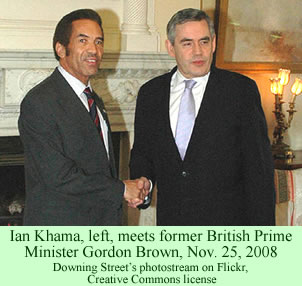The war of words between Survival International and the government of Botswana over the treatment of the G/wi has intensified recently, an unfortunate development for a society that has been characterized as highly peaceful.
Survival, a London-based indigenous rights NGO, apparently found the way to really capture the attention of the government and the general population of Botswana when it launched, in early October, an international boycott of Botswana diamonds and tourism. Kick ‘em where it hurts. The acrimony has been escalating, but it appears, from recent news sources, as if the SI campaign is making an impression.
The most recent round of accusations began with an official document on November 30th stating the position of the government about the SI boycotts. Survival, the government charged, wants the G/wi and the other San people “to live a life of poverty and disease in the Central Kalahari Game Reserve (CKGR), where there are no social amenities.” The British NGO has “the audacity and arrogance to target the economy of a promising developing country [i.e., Botswana].” It continued by claiming that the government only encouraged the San people to move out of their homes in the Central Kalahari Game Reserve nearly 10 years ago.
An African news source that same day, November 30, referred to SI as a “radical UK group,” imitating the government’s position, but it pointed out, interestingly, that Mmegi, a prominent independent Botswana news source, was increasingly covering the story and giving it wider circulation. It indicated that there is a lot of public outrage in Botswana over the boycott emanating from the UK, the former colonial power.
But perhaps of even more significance, the growing public discussion in Botswana seems to be swinging public opinion, at least to some extent, in favor of opening the borehole in the CKGR near the G/wi settlement and allowing the San peoples who insist on living there to have the water they seek. The government’s stubbornness on that matter is inflaming world opinion, the Botswana people seem to be concluding, which may force their country to lose revenues from tourism and diamond sales.
 SI has been responding to the government statements with its own campaign of countercharges. On December 10th, SI pilloried president Ian Khama for referring to the San people as “primeval,” “primitive,” and “backward.” SI almost seemed delighted with President Khama’s choice of words, writing in its rebuttal, “Khama also accused Survival of ‘embarking upon a campaign of lies and misinformation,’ calling the tribal rights organization ‘modern day highway robbers.’” The SI statement of course rehashed some of the previous history, referring to the way the government has prevented the San from having access to water, while it allows water to be allotted to the diamond industry and the tourist facilities.
SI has been responding to the government statements with its own campaign of countercharges. On December 10th, SI pilloried president Ian Khama for referring to the San people as “primeval,” “primitive,” and “backward.” SI almost seemed delighted with President Khama’s choice of words, writing in its rebuttal, “Khama also accused Survival of ‘embarking upon a campaign of lies and misinformation,’ calling the tribal rights organization ‘modern day highway robbers.’” The SI statement of course rehashed some of the previous history, referring to the way the government has prevented the San from having access to water, while it allows water to be allotted to the diamond industry and the tourist facilities.
Last Thursday, Mmegi published an SI opinion piece in which the organization corrected one of the earlier government charges. It indicated that SI had never said the San people should live in the CKGR, or live in a so-called primitive fashion. “All we have said,” the statement concludes, “is that the Bushmen must be allowed to stay on their lands if that is what they want, and to decide for themselves whether and how they should be ‘developed.’”
On Friday, the 17th, another news source from southern Africa again quoted President Khama’s description of SI as a bunch of highway robbers, that they are demanding “your money or your life.” The president evidently added that Survival survives off its highway robbery. Is it possible that the president was trying to be humorous? Otherwise, the whole debate—about whether or not people should be allowed to have water—would be very sad.